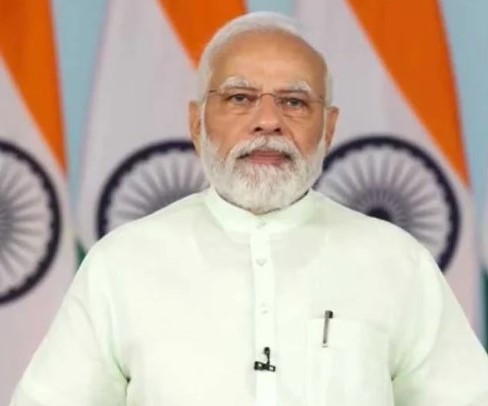Based on indigenous technology, the project will turn a new chapter in India’s waste-to-wealth endeavours by utilising about 2 lakh tonnes of rice straw (parali) annually to generate around 3 crore litres of Ethanol annually

On the occasion of World Biofuel Day, Prime Minister Narendra Modi dedicated the 2nd generation (2G) Ethanol Plant in Panipat, Haryana to the nation via video conferencing.
Governor of Haryana, Bandaru Dattatreya; Union Ministers - Narendra Singh Tomar, Hardeep Singh Puri, and Rameswar Teli, were among those present on the occasion.
The Prime Minister greeted the people on the occasion of World Biofuel Day. Terming the Ethanol Plant just a beginning he said that this plant will reduce pollution in Delhi, Haryana, and NCR.
The Prime Minister said, "In a country like ours that worships nature, biofuel is a synonym for protecting nature. Our farmer brothers and sisters understand this better. Biofuel for us means green fuel, environment-saving fuel."
He said that with establishment of this modern plant, farmers of Haryana, where rice and wheat are grown in abundance, will get another lucrative means of using crop residue.
The bio-fuel plant of Panipat will also be able to dispose of stubble without burning it. The Prime Minister remarked that it will lead to many benefits. The first advantage would be that mother earth would be freed from the pain that was caused by burning stubble. The second advantage would be that the new systems for stubble cutting and its disposal, new facilities for transportation and new biofuel plants will bring new employment opportunities in all these villages. The third advantage would be that the stubble which was a burden for the farmers, and was a cause of concern, would become a means of additional income for them. The fourth advantage will be that pollution will be reduced, and the contribution of farmers in protecting the environment will increase further. And the fifth benefit will be that the country will also get an alternative fuel.
The Prime Minister expressed happiness that such plants are coming up in various areas of the country.
The Prime Minister listed steps that aim to solve the problem in a comprehensive manner. Farmers Producer Organisations (FPO) were given financial support for ‘parali’, upto 80 percent subsidy on modern machinery for crop residue, and now this modern plant will help in providing a permanent solution to this problem, added Prime Minister.
The Prime Minister pointed out that due to the mixing of ethanol in petrol, in the last 7-8 years, about 50 thousand crore rupees of the country have been saved from going abroad. And about the same amount has gone to the farmers of our country because of ethanol blending.
He said till 8 years ago only 40 crore litre ethanol was produced in the country and now this production is about 400 crore litre.
The Prime Minister emphasised that till 2014, there were only around 14 crore LPG gas connections in the country. Half of the country's population, mothers and sisters, were left in the smoke of the kitchen. The damage caused by the ill health and inconvenience to sisters and daughters was not taken care of earlier. The Prime Minister also expressed happiness upon the delivery of more than 9 crore gas connections to poor women from the Ujjwala scheme alone.
He said, “Now we have almost reached 100% LPG coverage in the country. There are about 31 crore gas connections in the country today, increasing from 14 crores.”
The Prime Minister also pointed out that CNG stations increased to more than 4,500 from mere 800 eight years ago. Gas is reaching through pipes to more than a crore households. “Today, when we are completing 75 years of independence, the country is also working on the goal that in the next few years, more than 75 percent of the households in the country will get piped gas," said Prime Minister.
The 2G Ethanol Plant has been built at an estimated cost of over Rs. 900 crore by Indian Oil Corporation Ltd. (IOCL) and is located close to the Panipat Refinery. Based on indigenous technology, the project will turn a new chapter in India’s waste-to-wealth endeavours by utilising about 2 lakh tonnes of rice straw (parali) annually to generate around 3 crore litres of Ethanol annually.
Creating an end-use for the agri-crop residue would empower farmers and provide an additional income generation opportunity. The Project will provide direct employment to people involved in the plant operation and indirect employment will be generated in the supply chain for rice straw cutting, handling, storage, etc.
The project will have zero liquid discharge. By reducing the burning of rice straw (parali), the project will reduce Greenhouse Gases equivalent to about 3 lakh tonnes of Carbon Dioxide equivalent emissions per annum, which can be understood as equivalent to replacing nearly 63,000 cars annually on the country's roads.
Subscribe to our newsletter & stay updated.